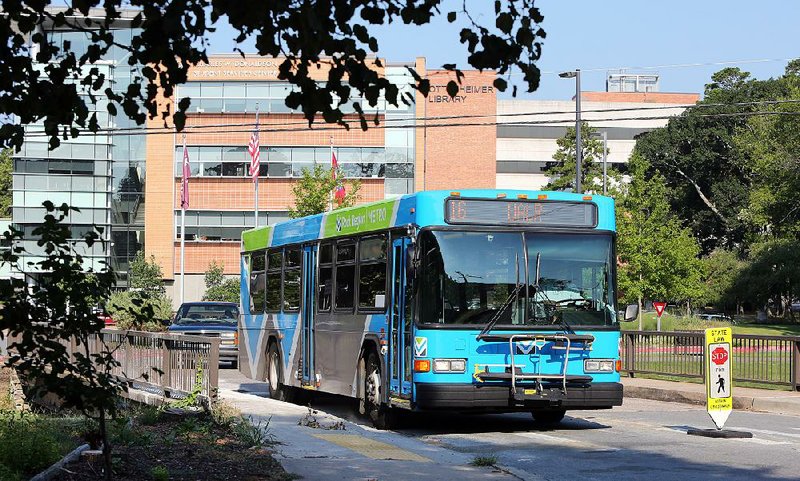Rock Region Metro’s proposal to overhaul its regular bus network will be the subject of two public hearings next month to help the Pulaski County transit agency decide whether to implement the changes in November as planned.
The back-to-back hearings on July 7-8 will be at Simmons Bank Arena in North Little Rock.
Each will be limited to 44 attendees on a first-come, first-serve basis to allow social distancing protocols to be in practice because of the coronavirus pandemic. Attendees also will be required to wear face coverings that fully cover their noses and mouths for the entire length of the meeting.
The first public hearing will be from 11:30 p.m. to 1 p.m. July 7. The second hearing will be from 5:30 p.m. to 7 p.m. the following day. In both cases, doors will open 30 minutes before the hearings begin.
Both meetings will kick off a 15-day comment period to allow interested parties to offer additional comments before the Rock Region’s board of directors takes up the proposal later the same month. After the July 8 meeting, undated information regarding the proposed changes, including maps, will be posted at the transit agency’s website, rrmetro.org.
Under the proposal, Rock Region will drop under-performing bus routes, replace some of them with micro-transit zones, expand service hours for remaining weekly and weekend bus service and increase stop frequency to 30 minutes for most routes.
Both Little Rock and North Little Rock will get new crosstown transfers, which eliminate going downtown to make a transfer. Little Rock would have a new transfer point at West Markham and Cedar and Pine streets, and North Little Rock would have one at Pershing Boulevard and Willow Street.
The proposed route plan, known as R.I.D.E. 2020, would add no costs to the system. R.I.D.E. is an acronym for Route Innovation, Development and Evaluation. It is being developed under a $300,000 contract with Transportation Management & Design Inc., a San Diego consulting firm specializing in mass transit.
Although routes will be dropped, the proposed restructured routes and micro-transit zones will be closer to a larger percentage of the population, according to the consultants.
In addition to expanded service hours on weekdays and weekends, more frequent stops and additional micro-transit zones, service will be simplified, more direct and faster, and extend bus service on Chenal Parkway to the Promenade at Chenal for the first time under the proposal.
During the week some routes will run an additional hour, to 9 p.m., and Saturday service will run an additional two hours, to 6 p.m. Both weekday and Saturday service start at 5 a.m.
Sunday service will be expanded an additional five hours, going from 8 a.m. to 7 p.m. It now runs from 9 a.m. to 4 p.m.
Two ro ute s w i l l b e dropped from the system under the proposal — Route 17 Mabelvale/Downtown, which officials say is largely redundant, and Route 25 Pinnacle Mountain, which is the route with the lowest ridership in the system.
Nine other routes will be shifted permanently to micro-transit zones under the draft network plan.
Microtransit is an on-demand service for areas where transit demand is less robust, in which smaller vehicles are used to pick up people at their door and take them to stops on regular routes. Riders can track their vehicles with real-time arrival push notifications and door-to-door service, and access places not previously accessed by regular bus service if it falls within the zone.
